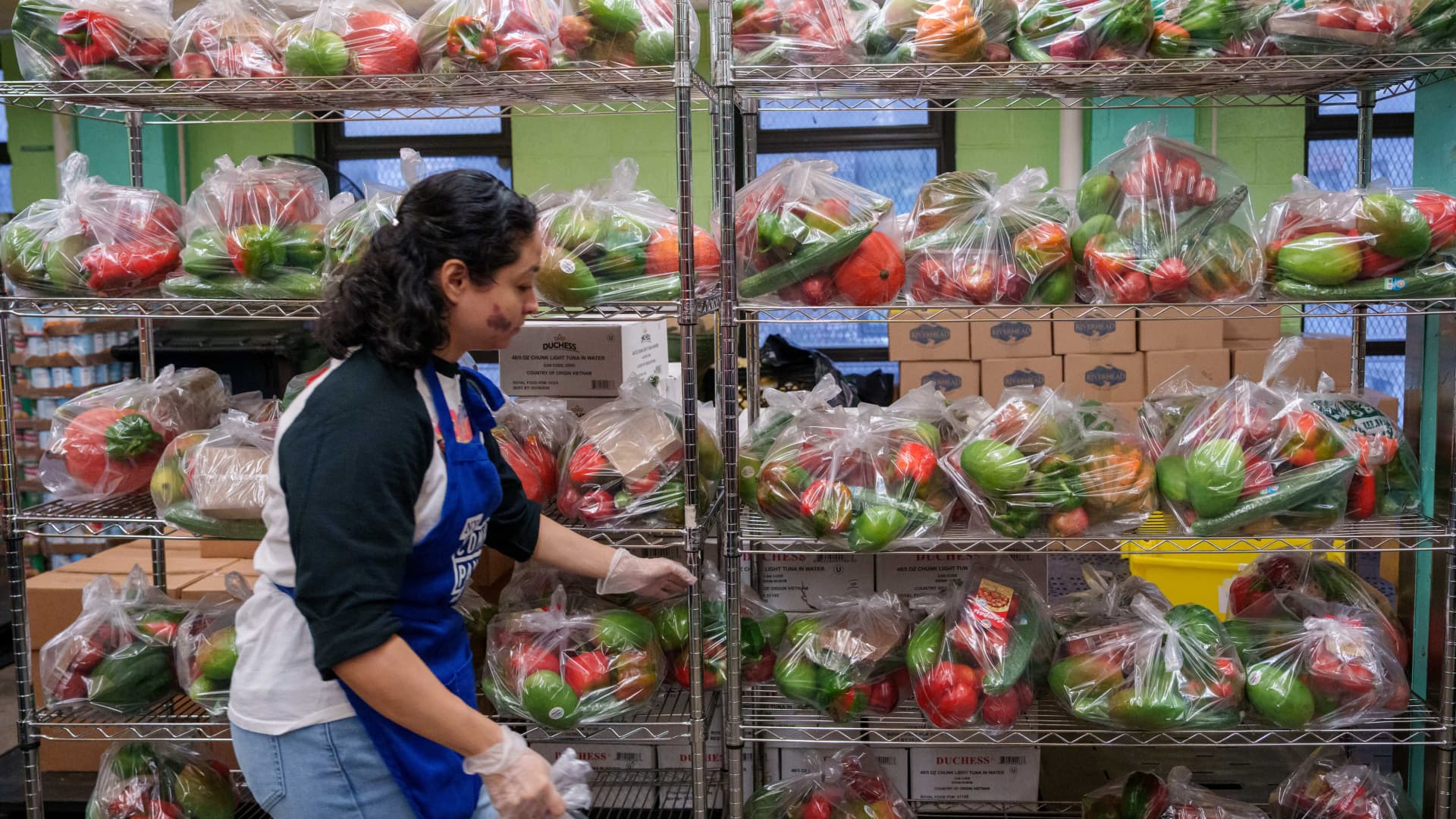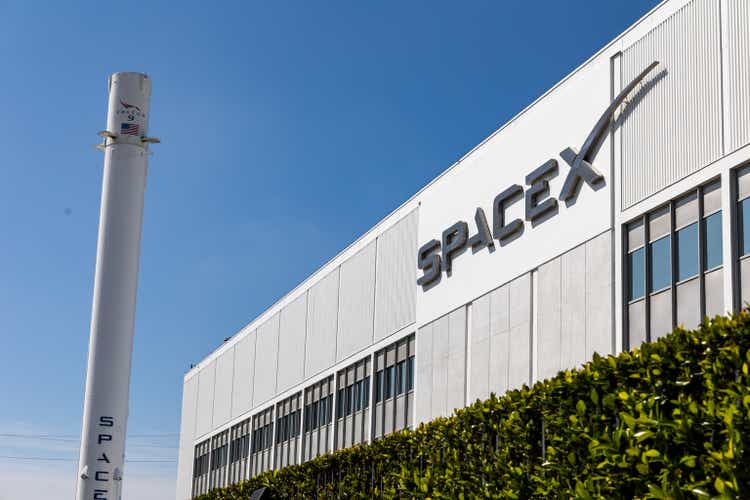Tens of millions of Individuals reside in worry that they may go hungry because of potential delays in SNAP meals help profit funds, even after a federal decide ordered the Trump administration to make funds in November. That is in a nation the place near $400 billion in meals is estimated to be prone to going to waste yearly.
ReFED, a U.S.-based nonprofit that focuses on meals waste, lately launched its 2025 report displaying that $382 billion in surplus meals was produced in 2023, the latest yr statistics had been accessible.
“Forty p.c of all meals is headed for the bin globally,” mentioned Chris MacAulay, head of surplus meals market Too Good to Go’s North American operation, which has expanded to 70 cities. “Visualize what which means — it could be like standing in entrance of the fridge and dumping half of it out. It’s an unimaginable quantity of waste,” MacAulay mentioned.
Too Good to Go would not divert extra meals that may discover its manner into meals banks, however supplies an outlet for meals that may sometimes get tossed. It matches grocery shops and eating places which have surplus meals with prospects in search of to fairly priced meals. As an illustration, a neighborhood pizza parlor might need some further pies on the finish of the night time. As an alternative of tossing them into the dumpster, they will no less than recoup one thing by providing them on Too Good to Go. Customers are matched with a “shock bag” that accommodates meals that might in any other case be despatched to the landfill. Too Good to Go estimates eight meals get saved each second by means of its market.
“We all know many Individuals are feeling larger pressure on their grocery budgets, particularly in gentle of the upcoming potential lapse in SNAP advantages,” MacAulay mentioned. “You do not know what you will get, however you’re going to get nice meals at a 50 to 60 p.c low cost,” he added.
On Sunday morning, Treasury Secretary Scott Bessent mentioned funds may start once more by Wednesday. The present SNAP disaster come amid broader cuts to the meals help program included within the Trump administration’s tax cuts, which is able to cut back the funds throughout the U.S.
Donation, composting, animal feed, and surplus meals marketplaces are major choices for meals waste.
“There may be not one answer, it is a mixture of options. We consider it as a meals waste provide chain,” MacAulay mentioned, including that grocers particularly discover its market a superb match for his or her surplus.
His group is not alone in seeing the necessity for extra options to the issue. More and more, everybody from massive buyers to mom-and-pop retailers are discovering that there are {dollars} to be salvaged within the meals waste enterprise, and folks to be fed.
“The quantity of transaction exercise and the quantity of curiosity within the sector is fairly spectacular,” mentioned Effram Kaplan, senior managing director at Brown Gibbons Lang & Firm, who heads its funding banking in environmental companies, environmental infrastructure, and vitality transition.
Kaplan says that whereas waste administration companies are nothing new, the consistency and predictability of returns is catching elevated investor consideration. “I have been on this enterprise for 25 years, and I consider that it has been undervalued for a while,” he mentioned.
Subtle, deep-pocketed infrastructure buyers who’re in search of secure returns are discovering that waste delivers earnings within the U.S. “Whereas that kind of capital has been prevalent in Europe for a while, it is solely simply begun right here,” Kaplan mentioned.
Limitations to entry within the enterprise are taking place, however moving into the enterprise nonetheless requires vital funding, usually in gear.
“I feel it’s simpler than ever as expertise lowers the barrier to entry for those who give you a good suggestion,” MacAulay mentioned.
Meals waste from residence to business kitchen
Some options are going proper to the buyer. Mill, a startup based by one of many creators of the Nest sensible thermostat, has $100 million in funding for its sensible kitchen bin that dries, shrinks, and de-stinks leftover meals, eliminating meals waste.
Different approaches are getting into on the business level of waste. Metafoodx, a startup that raised $9.4 million in Sequence A funding in Might 2024, has constructed a 3D AI scanner that tracks meals in business kitchens — what’s getting used, what’s wasted, and the place enhancements may be made.
Buddy Bockweg, CEO of Vsimple, which works with industrial and environmental service firms (together with waste administration suppliers) to digitize and streamline operations, from discipline dispatch to invoicing, say start-ups have a singular potential to deploy expertise to compete with bigger gamers.
“AI is ready to streamline every part on the dispatch aspect,” Bockweg mentioned. “Those which can be investing in expertise to advance their operations are those which can be profitable and making extra money.”
Tyler Frank, president and founding father of Portland, Maine-based Rubbish to Backyard, began small and has scaled up. He launched his enterprise in 2012 with $300 and one truck after realizing, whereas residing in his house, that there was no simple strategy to compost his waste. Rubbish to Backyard provides compost buckets and a subscription-based route pickup. The waste is composted and provided to space farms, or subscribers can have soil delivered again to them.
“I feel that the way in which that I did it was low barrier to entry, but it surely was a really lengthy, tough hill to climb. You need to obtain economies of scale,” Frank mentioned. He was motivated partially by the data that waste can be a enterprise no matter different financial components. “This can be a recession-resilient enterprise and an thought whose time has come,” Frank mentioned.
What began out as a one-bucket-at-a-time subscription is rising into increasingly municipal contracts. Rubbish to Backyard now serves 50,000 subscribers and has landed pickup contracts in cities like Boston and Medford, Massachusetts.
Decrease-income households waste much less
Whereas Frank’s enterprise mannequin would not sort out the issue of starvation — in reality, there could also be much less composted waste as individuals search to squeeze every part they will out of their meals throughout SNAP delays — he says the general development and movement of meals waste is up.
Ben Scharadin, professor of economics at Colby Faculty, says the federal government does play a big function within the innovation and development happening within the sector because of federal waste discount mandates and a want for companies to be extra environment friendly.
However a merciless irony of the present scenario is that SNAP beneficiaries usually tend to waste much less meals than others.
“Decrease-income households often have decrease meals waste charges than higher-income households. You probably have a stricter finances constraint, there may be not a lot wiggle room in households,” Scharadin mentioned. “Decrease-income and SNAP households are higher at planning their meals consumption as a result of they must be,” he mentioned.
Scharadin says youthful and extra prosperous households are likely to waste probably the most and that subscription compost companies can be thought of a premium. The round economic system must be bracing for some influence from the SNAP cuts, he mentioned, and enterprise fashions similar to Too Good to Go ought to profit.
“As issues get tighter on the finances finish for shoppers, there can be a faster flip to shock luggage and secondary markets which can be seemingly barely decrease high quality,” Scharadin mentioned.
Nonetheless, regardless of extra firms discovering novel methods to assault the waste situation, “the primary purpose in meals waste must be to scale back it,” Scharadin mentioned.



